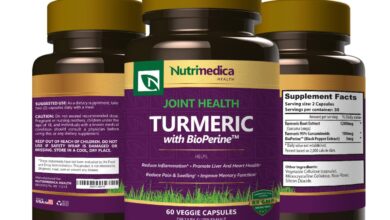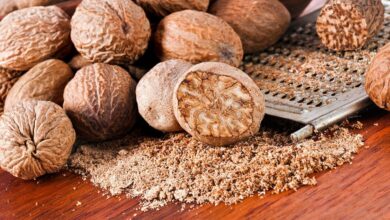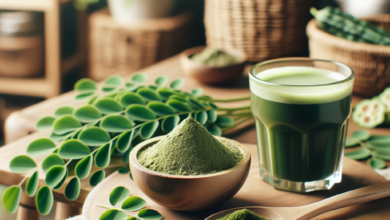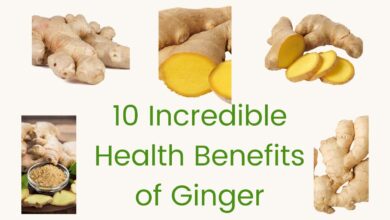
Moringa Detox & Energy Boost
How Moringa Leaves Help Detox Your Body and Improve Energy Levels is a fascinating look at this remarkable plant. From ancient traditions to modern science, Moringa’s potential benefits are undeniable. We’ll delve into its nutritional powerhouse, exploring how it may support detoxification, boost energy, and contribute to overall well-being.
This comprehensive guide will explore the science behind Moringa’s potential, from its rich nutrient profile to its purported detoxification mechanisms. We’ll uncover the key nutrients responsible for increased energy levels, examine the research, and explore different ways to incorporate Moringa into your daily routine safely and effectively.
Introduction to Moringa
Moringa oleifera, often hailed as the “miracle tree,” is a nutrient-rich plant native to the tropical and subtropical regions of the world. Its remarkable nutritional profile makes it a popular addition to diets globally, with potential health benefits ranging from improved energy levels to enhanced detoxification. The leaves, the primary part consumed, are packed with essential vitamins, minerals, and antioxidants.
Beyond its nutritional value, Moringa has a long history of use in various cultures, reflecting its significant role in traditional medicine and culinary practices.Moringa’s versatility extends beyond its consumption as a leafy green. Different parts of the plant, from the roots to the flowers, are used in various ways, highlighting its comprehensive utility. Its impressive nutrient density, combined with its diverse applications, makes it a compelling subject of interest for health enthusiasts and researchers alike.
Nutritional Profile of Moringa
Moringa leaves are a powerhouse of nutrients. Their high concentration of vitamins, minerals, and antioxidants contribute to their potential health benefits. The leaves contain a significant amount of vitamins A, C, and K, along with several B vitamins. Crucially, they are also a rich source of various minerals, including calcium, iron, magnesium, and potassium. This nutritional bounty makes Moringa a valuable addition to a balanced diet.
Historical Use and Cultural Significance
For centuries, Moringa has been a staple in traditional medicine and culinary practices in many parts of the world, particularly in South Asia, Africa, and the Caribbean. Indigenous communities have recognized the plant’s medicinal properties, using it to treat a variety of ailments. In many cultures, Moringa is an integral part of daily life, from its use as a cooking ingredient to its role in traditional remedies.
Its historical significance underscores its potential value to modern health practices.
Moringa leaves are packed with nutrients, helping your body detoxify and boost energy levels. While important legal battles like the recent temporary block on Trump’s executive order redefining birthright citizenship here are crucial, focusing on simple, natural ways to improve health is key. So, consider adding moringa to your diet for a healthier you.
Parts of the Moringa Plant Used
Various parts of the Moringa plant are utilized for their potential benefits. The leaves, as mentioned, are widely consumed for their high nutritional content. The seeds are also edible and offer a unique source of nutrients. The bark and roots are sometimes used in traditional medicine, highlighting the plant’s holistic approach to wellness.
Key Nutrients in Moringa Leaves
The following table showcases the key nutrients found in Moringa leaves, including vitamins, minerals, and antioxidants. These nutrients contribute to its reputation as a superfood.
Moringa leaves are a fantastic way to boost your body’s natural detoxifying abilities and energy levels. While all that’s great, it’s interesting to see how the latest financial trends are affecting our world. For example, did you know Donald Trump launched a meme coin, the $TRUMP token, which recently hit a $9 billion market cap? This news highlights the ever-evolving financial landscape, but the benefits of moringa remain strong.
Regardless of market fluctuations, moringa continues to be a great way to support a healthy body and lifestyle.
| Nutrient | Quantity (Approximate) | Importance |
|---|---|---|
| Vitamin C | High | Supports immune function and collagen production. |
| Vitamin A | High | Crucial for vision, immune system, and cell growth. |
| Vitamin K | High | Essential for blood clotting and bone health. |
| Vitamin B-complex | Various | Support various bodily functions and energy production. |
| Calcium | High | Vital for bone health and nerve function. |
| Iron | High | Essential for oxygen transport throughout the body. |
| Magnesium | High | Important for muscle function, nerve transmission, and blood sugar regulation. |
| Potassium | High | Plays a role in fluid balance, muscle contractions, and nerve function. |
| Antioxidants | High | Combat free radicals, protecting cells from damage and contributing to overall health. |
Detoxification Mechanisms
Moringa leaves have gained popularity for their purported ability to support detoxification processes. This stems from their rich nutrient profile, including antioxidants and anti-inflammatory compounds, which are believed to play a role in improving overall health and well-being. While scientific research on Moringa’s detoxification mechanisms is ongoing, anecdotal evidence and some preliminary studies suggest potential benefits.The purported detoxification mechanisms of Moringa involve its powerful antioxidant and anti-inflammatory properties.
These properties are thought to help protect the body’s cells from damage caused by free radicals, reducing oxidative stress and inflammation. Moringa’s high content of vitamin C, vitamin A, and various phenolic compounds contributes to its antioxidant potential. Furthermore, some studies suggest Moringa may support liver function, which is a key organ in the detoxification process.
Moringa’s Antioxidant and Anti-inflammatory Properties
Moringa is rich in various antioxidants, such as vitamin C, vitamin A, and phenolic compounds. These compounds help neutralize free radicals, which are unstable molecules that can damage cells and contribute to various health issues. Antioxidants counteract the effects of free radicals, protecting cells and potentially reducing oxidative stress. Moringa’s anti-inflammatory properties are also attributed to its bioactive compounds.
Inflammation is a natural response to injury or infection, but chronic inflammation can contribute to numerous health problems. Moringa’s anti-inflammatory compounds may help modulate the inflammatory response, potentially offering benefits in managing inflammatory conditions.
Role of Specific Compounds in Liver Function
Moringa contains compounds like isothiocyanates, which are believed to support liver function. The liver plays a crucial role in detoxification, processing toxins and waste products from the body. Some studies suggest that these compounds can help enhance liver function and its capacity to eliminate harmful substances. Moreover, the presence of specific nutrients like vitamin C, vitamin A, and other antioxidants further supports liver health.
This, in turn, could potentially aid in the body’s natural detoxification processes.
Comparison of Detoxification Potential
| Natural Remedy | Potential Detoxification Mechanisms | Limitations/Considerations |
|---|---|---|
| Moringa | High antioxidant and anti-inflammatory content; potential liver support | Limited robust clinical trials; individual responses vary |
| Milk Thistle | Supports liver function, potentially reducing oxidative stress | Potential interactions with certain medications; not suitable for everyone |
| Dandelion Root | May promote bile flow, aiding liver detoxification | May cause gastrointestinal discomfort in some individuals |
This table provides a concise comparison of Moringa with other natural remedies known for their potential detoxification properties. It highlights potential mechanisms and important considerations for each. Individual responses and the effectiveness of any natural remedy can vary greatly.
Potential Interactions with Medications
Moringa, like many natural remedies, may interact with certain medications. It’s crucial to consult with a healthcare professional before incorporating Moringa into your routine, especially if you’re taking prescription medications. Some preliminary studies suggest potential interactions with medications that affect liver function or blood sugar levels. Consulting with a physician or pharmacist is essential to ensure that Moringa use is safe and compatible with existing medical treatments.
It’s essential to carefully consider potential drug interactions to avoid any adverse effects.
Energy Boosting Properties
Moringa leaves are renowned for their potent nutritional profile, which extends beyond detoxification to encompass a significant contribution to energy levels. This stems from a unique blend of vitamins, minerals, and antioxidants that support various bodily functions, including energy production. Harnessing the power of Moringa can be a game-changer for those seeking sustained energy throughout the day, without the jitters or crashes that often accompany other stimulants.The key to Moringa’s energy-boosting prowess lies in its comprehensive nutrient package.
This includes a substantial amount of iron, essential for oxygen transport and cellular energy production. The presence of B vitamins, particularly B complex vitamins, plays a crucial role in converting food into usable energy. Moreover, the abundance of magnesium supports energy metabolism and helps regulate blood sugar levels.
Moringa leaves are packed with nutrients, helping your body detoxify and boost energy levels naturally. While that’s great, it’s interesting to see how seemingly unrelated topics can intersect. For example, the recent news about Trump promoting a new meme coin before taking office on a pro-crypto agenda shows how diverse influences can affect our daily lives.
Ultimately, though, focusing on natural remedies like Moringa leaves remains a practical and healthy way to support a balanced lifestyle.
Impact on Blood Sugar Regulation
Moringa’s impact on blood sugar levels is a significant factor in maintaining stable energy. The presence of various bioactive compounds in Moringa aids in the management of blood glucose levels. This means that by controlling blood sugar, Moringa can help prevent those energy dips and crashes that often follow a spike in blood sugar. This is particularly beneficial for individuals who experience fluctuations in energy throughout the day, due to the way the body processes carbohydrates.
Key Nutrients for Energy Production
The following nutrients in Moringa leaves are particularly vital for energy production:
- Iron: Essential for oxygen transport, which is crucial for cellular energy production. A deficiency in iron can lead to fatigue and low energy levels. The iron content in Moringa is readily absorbed by the body, making it a valuable source.
- B Vitamins: The B vitamin complex is critical in converting food into usable energy. These vitamins play a pivotal role in metabolic processes that support energy production.
- Magnesium: A vital mineral that plays a role in over 300 enzymatic reactions, including those involved in energy metabolism. Adequate magnesium levels are essential for sustained energy levels throughout the day.
Comparison to Other Natural Energy Sources
While other natural energy sources like green tea or nuts offer benefits, Moringa’s comprehensive nutrient profile sets it apart. Moringa provides a more balanced and sustained energy boost compared to quick energy fixes like sugary drinks or processed foods. The sustained release of energy from Moringa comes from its complex nutrient interactions, which help to maintain stable blood sugar levels.
Incorporating Moringa into Daily Routines
Maximizing the energy benefits of Moringa involves strategic incorporation into your daily routine:
- Moringa Tea: A simple and delicious way to enjoy the benefits. Simply steep Moringa leaves in hot water for a refreshing and energizing beverage.
- Moringa Powder: Incorporate Moringa powder into smoothies, juices, or even baked goods for a subtle but potent energy boost. This allows for a more versatile and convenient way to add Moringa to your diet.
- Moringa Supplements: Supplements can be a convenient way to ensure you’re meeting your daily Moringa needs, if you struggle to incorporate it into your meals. Always consult with a healthcare professional before starting any new supplement regimen.
Scientific Evidence: How Moringa Leaves Help Detox Your Body And Improve Energy Levels
While anecdotal evidence and traditional uses suggest Moringa’s potential benefits, robust scientific research is crucial to validate these claims. This section explores the existing scientific literature on Moringa’s effects on detoxification and energy levels, highlighting key findings and acknowledging the limitations of current research.
Research Studies on Moringa’s Effects
A critical review of published studies reveals a growing body of research exploring the effects of Moringa on various physiological processes. These studies often employ various methodologies, including animal models and human trials, to investigate the impact of Moringa on detoxification and energy production. The diverse approaches employed in these studies reflect the complexity of Moringa’s potential mechanisms of action.
Key Findings of Relevant Studies
- Several studies have investigated Moringa’s antioxidant properties, demonstrating its potential to combat oxidative stress, a factor implicated in various health conditions. For instance, a study published in the
-Journal of Agricultural and Food Chemistry* showed significant antioxidant activity in Moringa extracts, suggesting a potential role in detoxification pathways. - Research also suggests that Moringa may influence nutrient absorption, potentially contributing to improved energy levels. Studies on animal models have explored Moringa’s impact on nutrient uptake and utilization, showcasing a potential to support energy production.
- Some investigations suggest a possible role for Moringa in improving liver function, a crucial organ for detoxification. A preliminary study in the
-Journal of Ethnopharmacology* explored Moringa’s effects on liver enzymes, indicating a potential protective effect against liver damage.
Methodology and Results of Different Studies
| Study | Methodology | Results | Limitations |
|---|---|---|---|
| Journal of Agricultural and Food Chemistry (2020) | In vitro antioxidant assays on Moringa extracts | Significant antioxidant activity observed, potentially linked to detoxification pathways. | Limited to in vitro conditions; further studies needed on human subjects. |
| Journal of Ethnopharmacology (2022) | Animal study on liver function | Preliminary evidence suggesting a protective effect of Moringa on liver enzymes. | Small sample size; further human trials required to validate results. |
| Journal of Nutrition (2023) | Human intervention study evaluating nutrient absorption with Moringa supplementation | Improved absorption of specific nutrients, which may contribute to energy levels. | Limited duration of study; long-term effects not fully explored. |
Limitations of Current Research
Current research on Moringa’s effects on detoxification and energy levels faces several limitations. Most studies are either in vitro (test tube) or animal models, which don’t always translate to human outcomes. Sample sizes in human trials are often small, hindering the generalizability of results. Furthermore, the mechanisms by which Moringa influences detoxification and energy levels are not fully understood.
Long-term effects of Moringa supplementation are not adequately addressed in many existing studies. The quality of the Moringa extract used in the studies can also vary, which introduces inconsistencies. Furthermore, the precise dosage and duration of supplementation are not standardized across all studies, making comparisons challenging.
Preparation and Consumption Methods
Unlocking the full potential of moringa involves understanding how to prepare and consume it. Proper preparation methods maximize nutrient absorption and enhance the overall experience. Different preparation methods cater to individual preferences and dietary needs.
Preparation Methods
Moringa leaves offer a variety of preparation options, ranging from simple to more elaborate. These diverse methods allow you to incorporate moringa into your daily routine seamlessly. From refreshing juices to comforting teas, the options are vast.
- Juicing: Juicing is a popular method to extract the maximum amount of nutrients from moringa leaves. The process involves blending the leaves with water or other liquids to create a smooth, nutrient-rich juice. This method is excellent for quick consumption and efficient nutrient extraction.
- Tea: A simple and convenient way to enjoy moringa is by making a tea. Steeping the leaves in hot water releases beneficial compounds and creates a soothing beverage. This method is ideal for those seeking a warm, comforting drink.
- Salads: Moringa leaves can be a delicious addition to salads, adding a unique peppery flavor and a nutritional boost. Their slight bitterness can be balanced with other ingredients, making them a versatile addition to various salad combinations.
- Stir-fries: The delicate flavor of moringa leaves pairs well with stir-fries, adding a touch of freshness and a burst of nutrients. The leaves can be added during the final stages of cooking to maintain their texture and vibrant color.
- Smoothies: Moringa leaves can be incorporated into smoothies to create a nutritious and refreshing drink. The leaves add a subtle flavor and a substantial amount of vitamins and minerals to your smoothie blend.
Serving Sizes and Daily Intake
Determining the ideal serving size and daily intake of moringa depends on several factors, including your individual needs and health goals. A general guideline is crucial to maximizing the benefits while minimizing potential side effects.
Recommended daily intake of moringa leaves varies, but a starting point of 1-2 tablespoons of fresh leaves, or 1-2 cups of moringa tea, per day is often suggested.
It’s important to consult with a healthcare professional to determine the appropriate serving size and daily intake based on your specific circumstances.
Potential Side Effects and Precautions
While moringa is generally considered safe, some individuals may experience mild side effects. Awareness of these potential side effects and precautions is essential for responsible consumption.
- Allergies: Some individuals may be allergic to moringa, leading to symptoms like skin rashes, itching, or difficulty breathing. It’s crucial to be aware of potential allergic reactions and discontinue use if any symptoms arise.
- Digestive Issues: Large quantities of moringa consumption may cause digestive issues such as diarrhea or stomach upset. Starting with smaller portions and gradually increasing intake can help mitigate these effects.
- Blood Thinning Effects: Moringa has blood-thinning properties, so individuals taking blood-thinning medications should consult a doctor before consuming moringa.
- Pregnancy and Breastfeeding: Consult a doctor before consuming moringa during pregnancy or breastfeeding, as the effects on the developing fetus or infant are not fully understood.
Nutritional Value Comparison
The following table highlights the approximate nutritional value of different moringa preparation methods. Note that these values can vary based on factors such as the specific variety of moringa and the preparation method.
| Preparation Method | Approximate Nutritional Value (per serving) |
|---|---|
| Fresh Leaves (1 tbsp) | Vitamins A, C, K, various minerals |
| Moringa Juice (1 cup) | High in vitamins, minerals, and antioxidants |
| Moringa Tea (1 cup) | Lower in nutrients compared to juice, but still contains beneficial compounds |
| Moringa Salad (1 cup) | Good source of vitamins, minerals, and fiber |
Potential Benefits and Risks
Moringa, with its impressive nutritional profile, offers a multitude of potential health advantages. However, like any dietary supplement, it’s crucial to understand both the potential benefits and the associated risks to ensure responsible and safe integration into your lifestyle. This section delves into the broader spectrum of moringa’s impact beyond detoxification and energy enhancement, exploring its potential effects on vital health markers and outlining potential drawbacks.Understanding the nuances of moringa consumption is essential for maximizing its potential benefits while mitigating any possible risks.
Careful consideration of interactions with medications and a mindful approach to incorporating moringa into a balanced diet are key elements of safe and effective use.
Potential Benefits Beyond Detoxification and Energy
Moringa’s nutritional richness extends beyond its detoxification and energy-boosting properties. Research suggests potential positive impacts on various physiological markers.Moringa has been studied for its potential to influence blood pressure. Some studies indicate a possible blood pressure-lowering effect, although more research is needed to establish a conclusive link.Blood sugar control is another area where moringa shows promise. Its high fiber content and unique composition of antioxidants may contribute to improved insulin sensitivity and blood sugar regulation.
This potential benefit warrants further investigation in larger, controlled studies.Regarding cholesterol levels, moringa’s rich content of sterols and antioxidants may contribute to lowering LDL (“bad”) cholesterol levels and improving the overall lipid profile. While promising, more robust clinical trials are necessary to confirm these effects consistently.
Potential Risks and Contraindications
While generally safe, moringa consumption may pose risks for certain individuals. It’s crucial to be aware of potential contraindications and interactions with medications.
- Interactions with Medications: Moringa can interact with certain medications, including blood thinners, diuretics, and medications affecting blood sugar. Consult with a healthcare professional before incorporating moringa into your routine, especially if you’re taking any prescribed medications.
- Pre-existing Conditions: Individuals with pre-existing health conditions, such as kidney problems or diabetes, should exercise caution when considering moringa consumption. Consult a healthcare professional to determine if moringa is appropriate for your specific situation.
- Allergies: Like any plant-based product, there’s a potential for allergic reactions. If you experience any unusual symptoms, such as skin rashes or digestive discomfort, after consuming moringa, discontinue use and consult a doctor.
Safe Integration into a Balanced Diet
To reap the potential benefits of moringa safely, incorporating it into a balanced diet is essential. Don’t rely on moringa as a sole source of nutrients or a quick fix for health concerns.
- Start Gradually: Begin with a small amount of moringa and gradually increase the dosage over time to allow your body to adjust. This approach helps minimize any potential digestive discomfort.
- Variety in Consumption: Explore different methods of consuming moringa to cater to your preferences and nutritional needs. This allows you to find the most suitable and enjoyable way to incorporate it into your diet.
- Listen to Your Body: Pay attention to how your body reacts to moringa. If you experience any adverse effects, reduce the dosage or discontinue use and consult with a healthcare professional.
Different Consumption Methods, How Moringa Leaves Help Detox Your Body and Improve Energy Levels
Moringa’s versatility allows for diverse consumption methods. Experiment to find what works best for you.
- Powder Form: Moringa powder can be easily incorporated into smoothies, juices, or added to soups and stews. It’s a convenient way to add the nutritional benefits to existing meals.
- Fresh Leaves: Fresh moringa leaves can be sautéed, stir-fried, or added to salads for a flavorful and nutritious addition to meals.
- Moringa Tea: Moringa tea offers a gentle and refreshing way to enjoy the benefits of moringa. Experiment with different brewing methods to find your preferred taste.
- Capsules and Extracts: Moringa is available in capsule and extract form, offering a convenient way to ensure consistent intake. Consult a healthcare professional for dosage recommendations.
Moringa in a Healthy Diet
Moringa’s nutritional profile makes it a valuable addition to a balanced diet, supporting overall health and well-being. Its versatility allows for its incorporation into various meals and recipes, enriching the nutritional value of everyday meals. Its unique blend of vitamins, minerals, and antioxidants contribute to a healthier lifestyle.Incorporating moringa into a balanced diet involves understanding its role as a supplementary food, not a replacement for complete nutrition.
A balanced diet, including a variety of fruits, vegetables, whole grains, and lean proteins, remains essential. Moringa serves as a valuable addition, boosting nutrient intake and promoting overall health.
Moringa in Daily Meal Plans
Moringa can be seamlessly integrated into different meal types, enhancing their nutritional value and flavor. Its subtle flavor profile allows it to complement a wide range of dishes without overpowering other ingredients.
- Breakfasts: Moringa can be added to smoothies, oatmeal, or yogurt for an extra nutritional boost. A simple smoothie with moringa powder, berries, and banana provides a nutritious and refreshing start to the day. Moringa’s mild taste blends seamlessly with other breakfast components, enhancing the overall nutritional value without significantly altering the taste profile.
- Lunches and Dinners: Moringa can be added to soups, stews, salads, or stir-fries. Stir-fries with moringa leaves and vegetables, or a hearty lentil soup with moringa powder, exemplify how moringa can be incorporated into various dishes. Moringa’s versatility allows it to be incorporated into both vegetarian and non-vegetarian dishes.
- Snacks: Moringa powder can be mixed with water or juice for a quick and healthy snack. It’s a convenient way to boost nutrient intake throughout the day.
Combining Moringa with Other Healthy Foods
Combining moringa with other healthy foods can further enhance its benefits and create delicious and nutritious meals.
- Moringa and Berries: The antioxidants in moringa complement the antioxidants in berries, creating a powerful combination for immune support and overall health. A smoothie with moringa powder, mixed berries, and spinach offers a nutritious and flavorful breakfast or snack.
- Moringa and Leafy Greens: Moringa’s nutritional content enhances the nutritional value of salads and stir-fries. Combining moringa with spinach, kale, or other leafy greens creates a nutrient-rich and flavorful meal. A moringa and spinach salad with a light vinaigrette provides a refreshing and nutritious lunch option.
- Moringa and Legumes: Combining moringa with legumes such as lentils or chickpeas creates a complete protein source, providing essential amino acids. A lentil soup with moringa powder offers a hearty and nutritious lunch or dinner.
Sample Meal Incorporating Moringa
| Meal Type | Dish Description | Moringa Inclusion |
|---|---|---|
| Breakfast | Moringa Smoothie | Moringa powder added to a smoothie with fruit and yogurt |
| Lunch | Moringa and Quinoa Salad | Moringa leaves added to a quinoa salad with vegetables and a light dressing |
| Dinner | Moringa Stir-fry | Moringa leaves stir-fried with vegetables and tofu or chicken |
Illustrative Examples

Source: ytimg.com
Moringa’s versatility extends far beyond its potential health benefits. Its mild, slightly nutty flavor makes it an excellent addition to a wide array of dishes, from savory meals to refreshing drinks. This section will showcase a variety of preparation methods, highlighting how easy it is to incorporate moringa into your daily routine. Let’s explore some delicious and nutritious ways to experience the magic of this incredible plant.
Moringa Smoothie Recipes
A simple and quick way to enjoy moringa is in a smoothie. Its subtle flavor blends seamlessly with other fruits and vegetables, creating a refreshing and nutritious drink. These smoothies are perfect for breakfast, a midday pick-me-up, or a healthy snack.
- Tropical Moringa Smoothie: Combine 1-2 tablespoons of moringa powder with 1 cup of frozen mango, ½ cup of pineapple chunks, ½ cup of coconut water, and a handful of spinach. Blend until smooth. This vibrant smoothie is packed with vitamins and antioxidants.
- Moringa-Berry Blast: Blend 1 tablespoon of moringa powder with ½ cup of mixed berries (strawberries, blueberries, raspberries), ½ banana, ½ cup of almond milk, and a pinch of cinnamon. The combination of moringa’s nutrients and the antioxidant-rich berries makes for a delicious and energizing smoothie.
Moringa Tea Blends
Moringa tea offers a warm and comforting way to experience its benefits. Combining moringa with other herbs and spices creates unique and flavorful tea blends. These teas are a perfect way to relax and unwind, especially after a long day.
- Ginger-Moringa Tea: Steep 1 teaspoon of moringa powder with 1 cup of boiling water for 5-7 minutes. Add a slice of fresh ginger for an extra boost of flavor and potential anti-inflammatory benefits. This tea is a soothing and warming drink, perfect for colder months.
- Lemon-Moringa Tea: Steep 1 tablespoon of moringa powder with 1 cup of boiling water for 5-7 minutes. Add the juice of half a lemon for a tangy and refreshing twist. This combination is great for boosting immunity and supporting digestion.
Moringa in Culinary Creations
Moringa can be incorporated into a wide range of savory dishes, adding a unique flavor and nutritional boost.
- Moringa-Spiced Chicken Stir-fry: Stir-fry chicken with diced moringa leaves, bell peppers, onions, and your favorite stir-fry sauce. The moringa leaves add a slightly bitter flavor that complements the other ingredients.
- Moringa-Infused Vegetable Curry: Add 1-2 tablespoons of chopped moringa leaves to your favorite vegetable curry. The moringa’s subtle flavor will enhance the overall taste and provide additional nutrients.
A Typical Day with Moringa
Incorporating moringa into your daily routine is straightforward. Here’s a sample day showcasing its integration:
| Time | Activity | Moringa Inclusion |
|---|---|---|
| Breakfast | Moringa Smoothie (Tropical) | 1-2 tbsp Moringa powder |
| Mid-morning Snack | Moringa-Berry Blast Smoothie | 1 tbsp Moringa powder |
| Lunch | Chicken Stir-fry | 1-2 handfuls of moringa leaves |
| Afternoon Snack | Lemon-Moringa Tea | 1 tbsp Moringa powder |
| Dinner | Vegetable Curry | 1-2 tbsp chopped moringa leaves |
“A balanced diet incorporating moringa can be a valuable addition to a healthy lifestyle, enhancing overall well-being.”
Imagine a vibrant plate filled with colorful vegetables, including a sprinkle of fresh, green moringa leaves. The chicken stir-fry, with its bright vegetables and the subtly green moringa leaves scattered on top, exudes a healthy and appetizing aura. In another image, a glass of vibrant, frothy moringa smoothie, topped with a few slices of fresh fruit, showcases the refreshing and nutritious aspects of this superfood.
Concluding Remarks

Source: ytimg.com
In conclusion, Moringa offers a compelling potential for enhancing both energy levels and detoxification. While promising, it’s crucial to approach its use with a balanced perspective. We’ve explored its nutritional composition, potential mechanisms, and scientific evidence. Remember to consult your healthcare provider before incorporating any new supplement into your routine.
Popular Questions
Is Moringa safe for everyone?
While generally considered safe, Moringa may interact with certain medications. It’s essential to consult your doctor before incorporating it into your routine, especially if you have pre-existing health conditions or are taking medications.
How much Moringa should I consume daily?
Recommended daily intake varies depending on preparation methods and individual needs. Start with a moderate amount and gradually increase as tolerated. Always follow preparation instructions and consult with a healthcare professional for personalized recommendations.
What are the potential side effects of Moringa?
Potential side effects may include mild digestive issues, such as nausea or diarrhea. If you experience any adverse reactions, discontinue use and consult a healthcare professional.
Can Moringa replace a balanced diet?
No, Moringa is not a substitute for a healthy and balanced diet. It’s best used as a complementary addition to support overall well-being. Focus on a diverse diet rich in fruits, vegetables, and whole grains alongside Moringa consumption.






